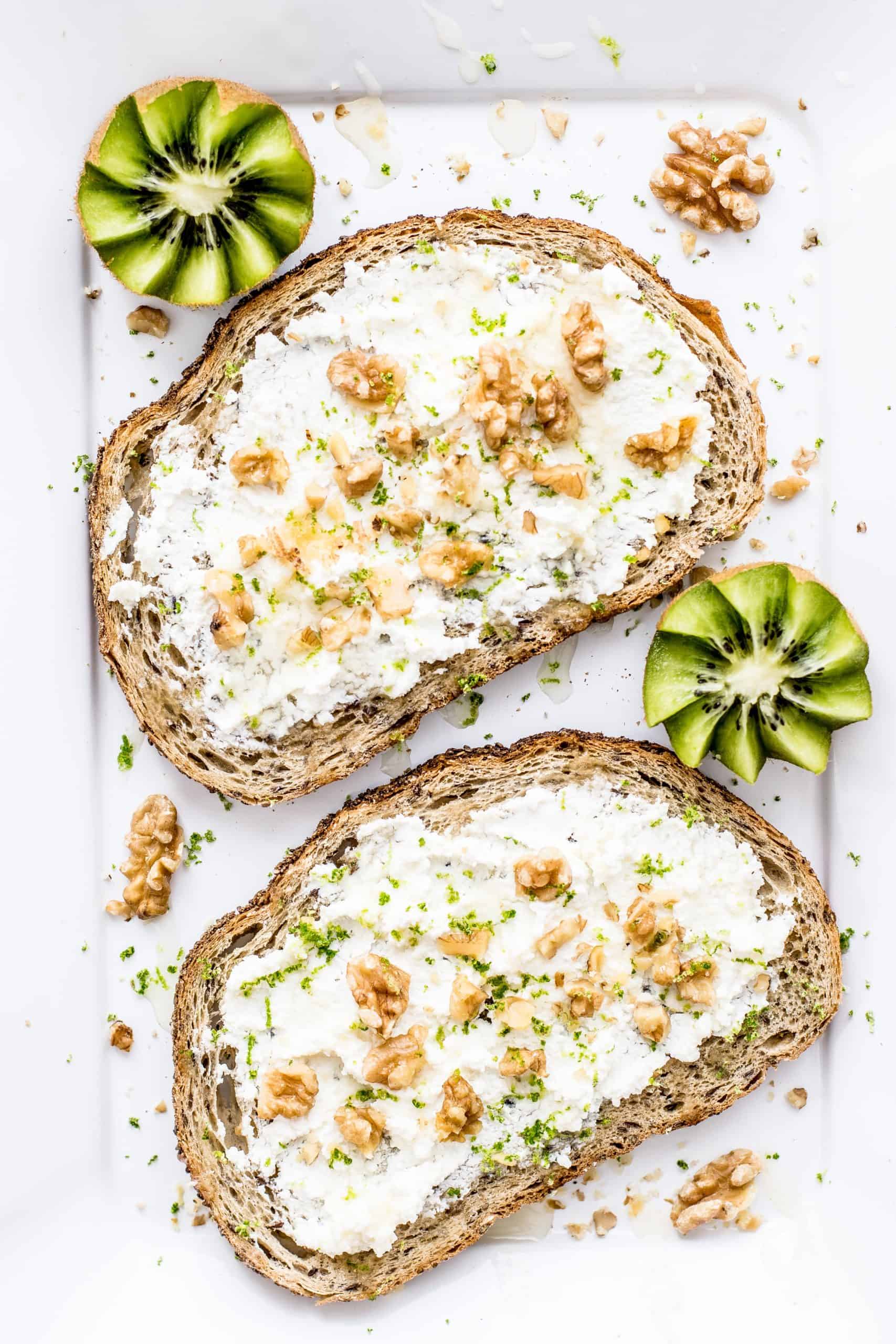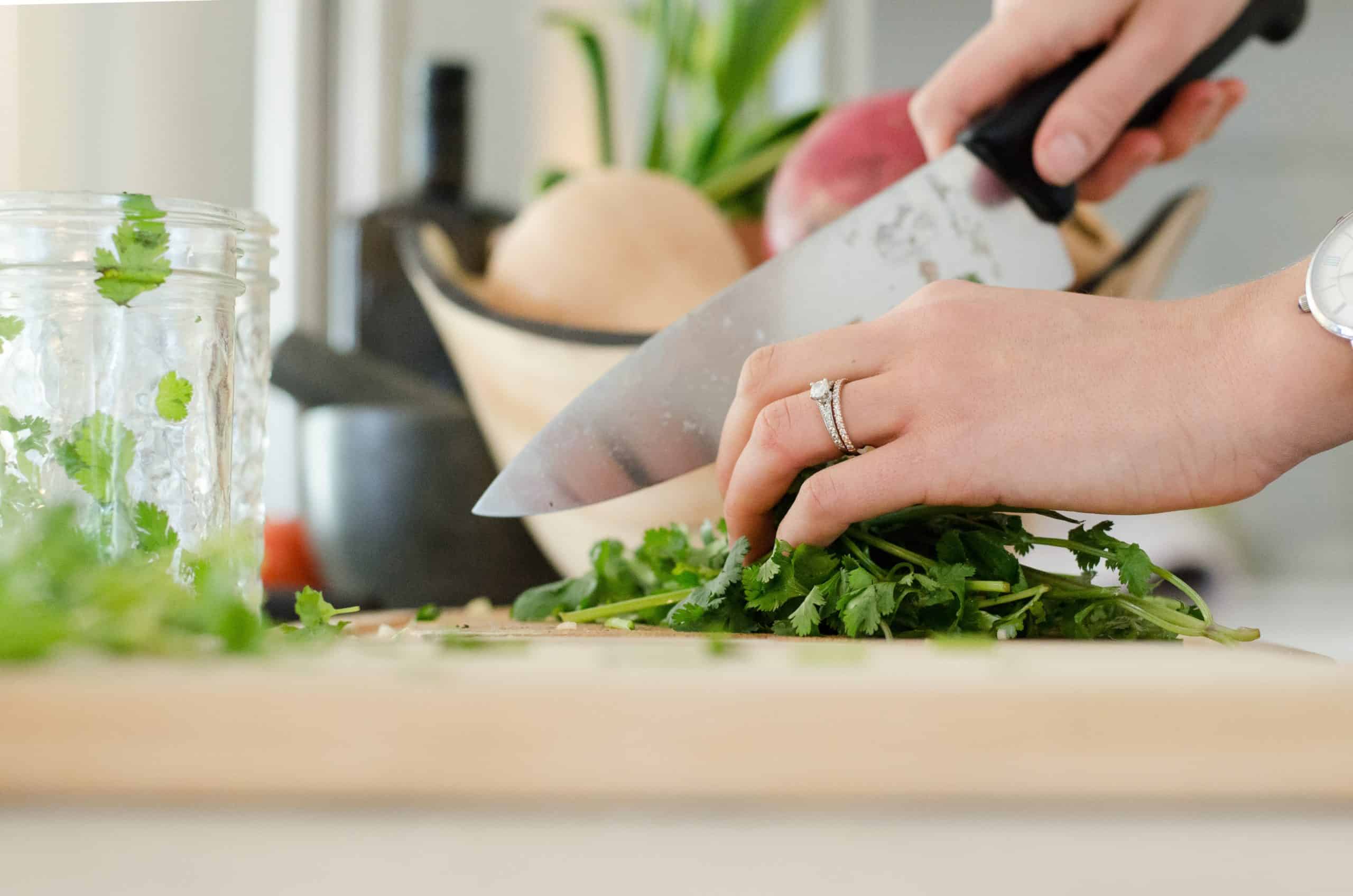Clean Eating Food List Printable for Beginners
This post may contain affiliate links. All opinions shared are my own. As an Amazon Associate I earn from qualifying purchases. Click to view our full disclosure.
All content is created by humans – not AI.
Not sure where to start in your clean eating journey? We created a clean eating grocery list for you with tips on what types of foods to buy, along with a printable clean eating shopping list to take to the store with you!
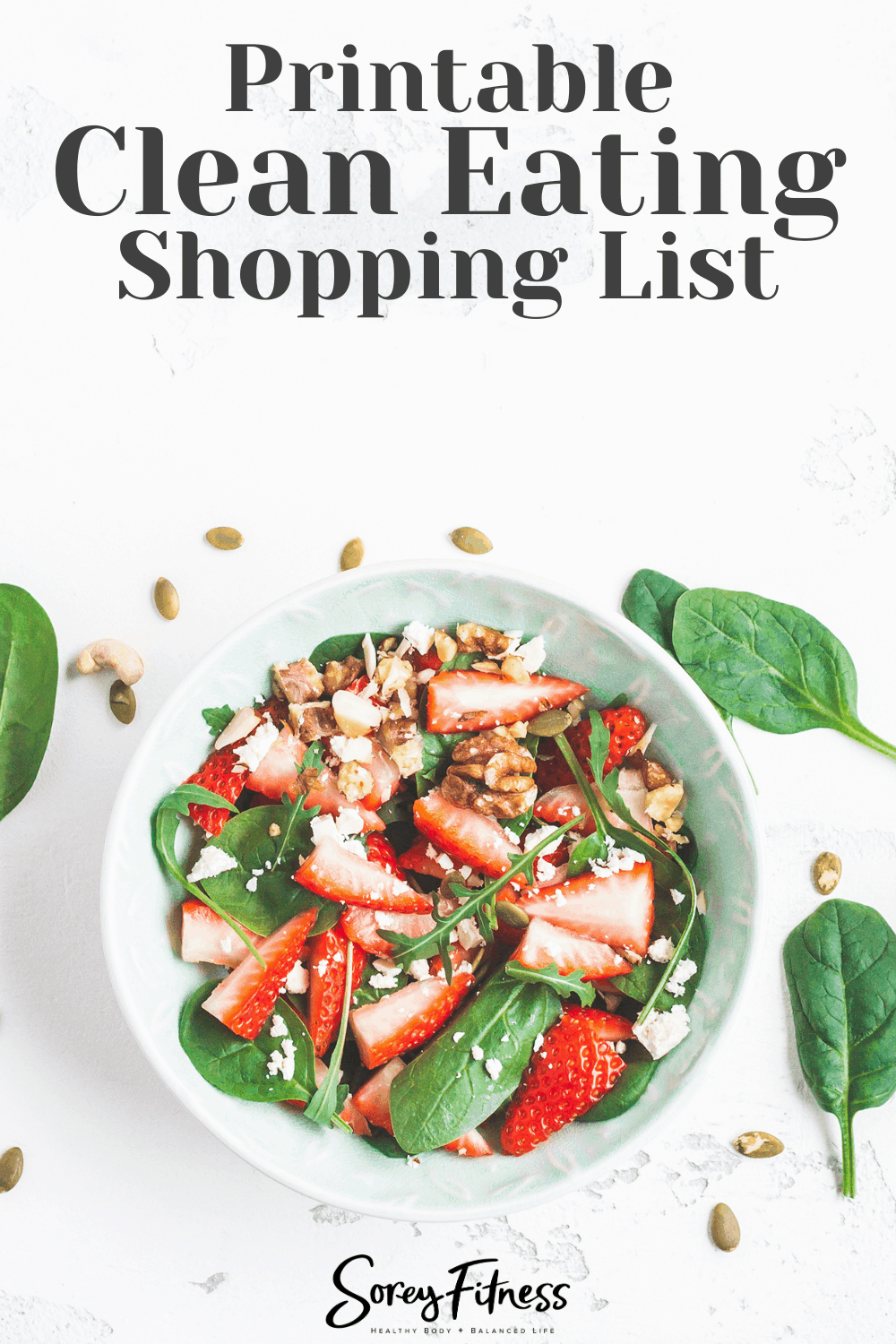
You’ve read about the benefits of a clean eating diet and how it’s good for overall health, but if you’re not quite sure where to start, we created a clean eating grocery list for you to get you started in your meal planning and grocery shopping.
Building on the foundation of our complete guide on clean eating for beginners, we created a clean eating grocery list and printable shopping list to make healthy, clean eating a bit easier.
What is clean eating?
The emphasis of clean eating is on eating food that is minimally processed and as close to natural as possible and avoiding artificial ingredients (like colors, preservatives, and sweeteners). Some processing is inevitable with many foods we eat (like most store bought milk is pasteurized, and grinding meat into hamburger is a type of processing), but we can choose foods that are altered less than others.
Our goal with clean eating is to eat whole foods most of the time.
This is not a short term diet as much as it’s a long term way of eating for overall health, so it’s okay to have treats! Make sure to work on having a healthy relationship and attitude towards food overall to avoid orthorexia.
Tip:: Focus on choosing nourishing foods for your body rather than labeling foods as inherently good or bad.
To help you kick off your nutritious clean eating journey, here’s our grocery lists for you to read through. Plus we have a printable list to take shopping with you! Our lists aren’t comprehensive, so if there’s a whole food you love that’s missing on the list, write it in :)
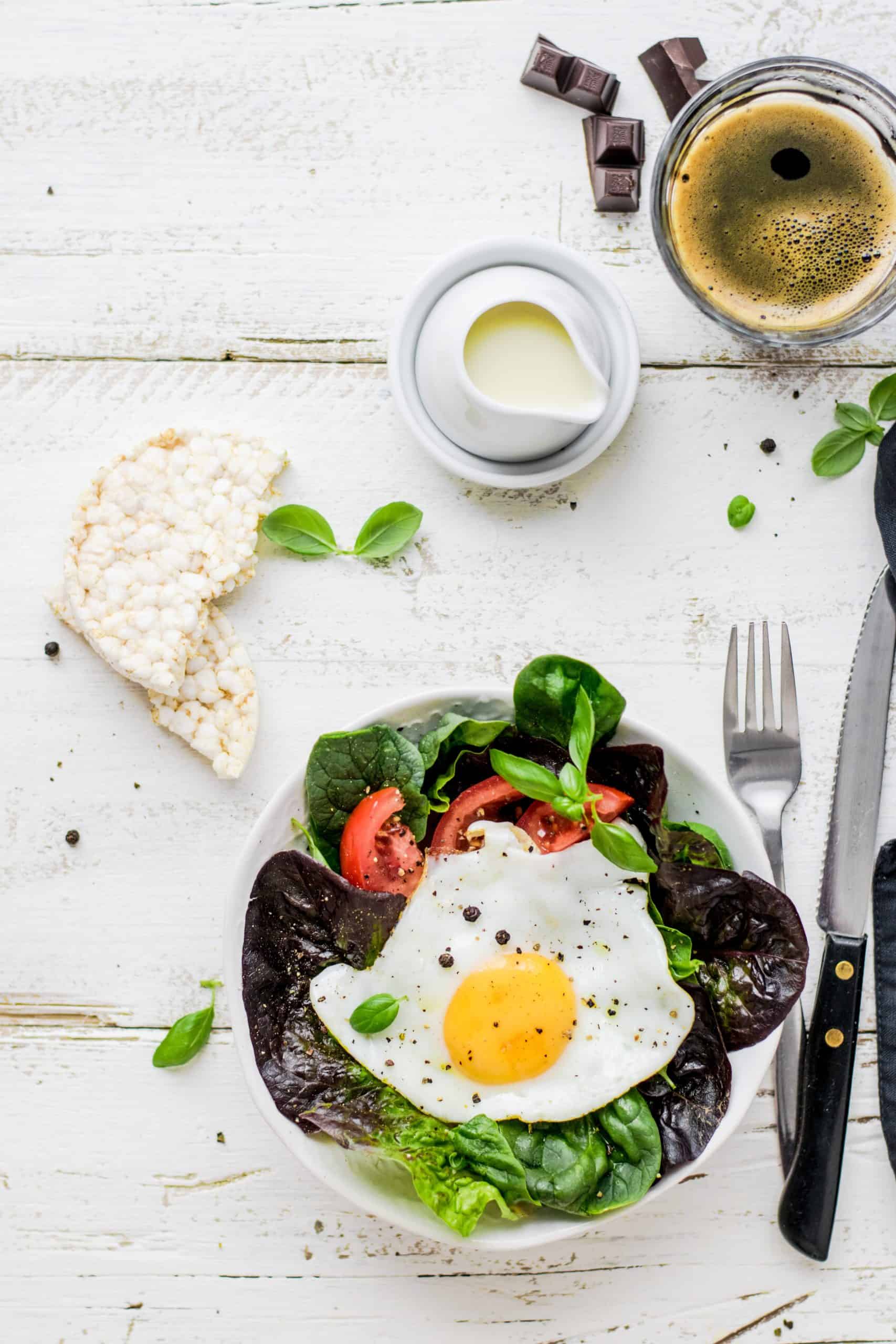
Vegetables
Pretty much every vegetable is great for you if you’re clean eating as long as:
- you don’t have allergies to them, and
- you aren’t avoiding high FODMAP veggies if you have IBS.
Always take into consideration any food allergies or other health issues you might have first.
It’s recommended that you consume 5-10 servings of fruits and vegetables each day.
That seems like a lot at first, but it’s easy to work them into your meals and 1 serving of vegetables is 1/2 cup of cooked veggies, so just 1 cup of cooked zucchini is 2 servings of vegetables.
With lists like ours, cross off anything you dislike or have allergies to, and then you have a list of great options available to you when you need to shop or meal plan.
We’re including root vegetables and tubers in this list as well:
- Asparagus
- Broccoli
- Brussels sprouts
- Cucumbers
- Zucchini or summer squash
- Winter squashes (such as spaghetti squash, pumpkins, acorn squash, etc.)
- Jicama
- Lettuce, spinach, and other leafy greens
- Mushrooms
- Carrots
- Parsnips
- Tomatoes (actually a fruit but we’ll include it on our list of vegetables, too)
- Cucumbers (also a fruit)
- Cauliflower
- Parsnips, turnips, and rutabagas
- Green beans
I didn’t include corn on this list since corn is technically a grain, but if you love corn on the cob, consider it a starchy vegetable (like squash is) or a grain.
Beans and tubers
Both regular white potatoes and sweet potatoes are good for you! Just make sure to keep the skin on to get the full benefits of the fiber in the skin.
- Beans of all varieties (butter beans, black beans, pinto beans, etc.)
- Refried beans that don’t contain hydrogenated oils
- Potatoes (all varieties)
- Sweet potatoes and yams
- Tiger nuts (not actual nuts but tubers)
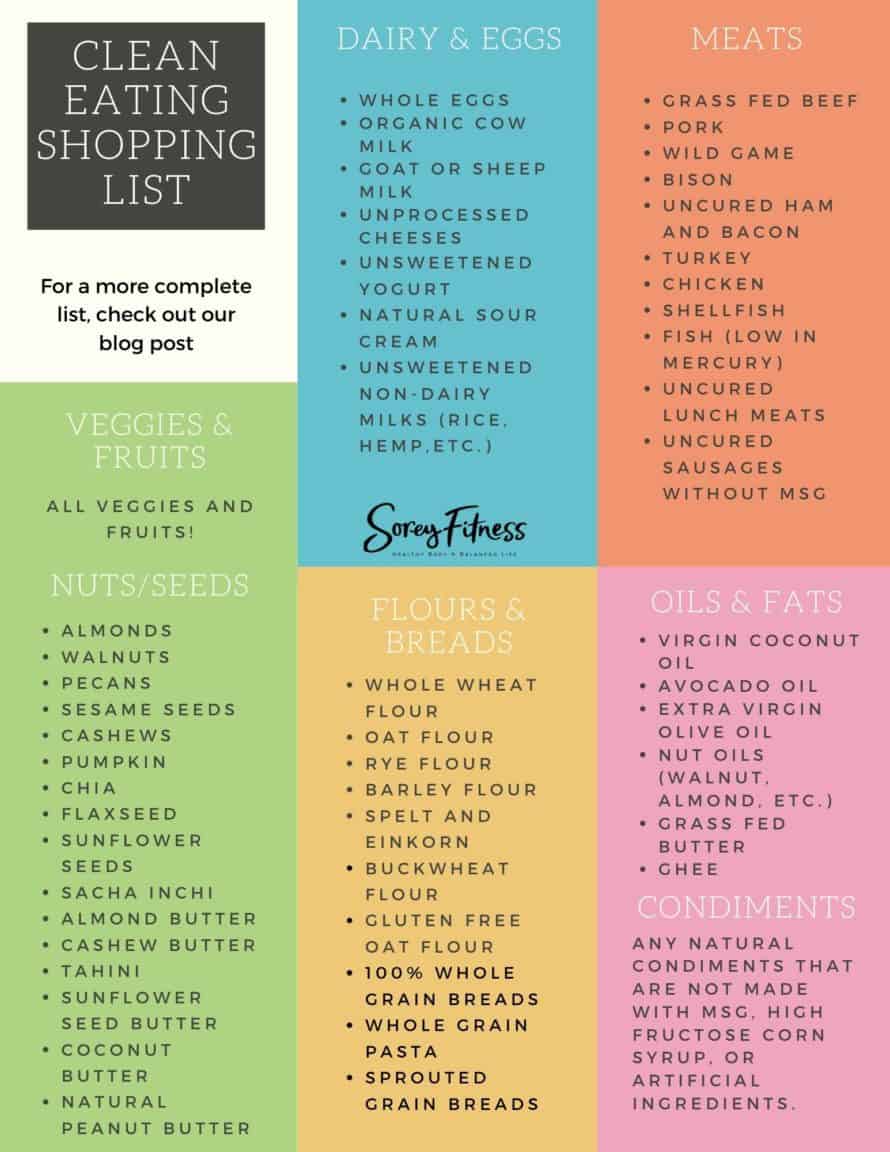
Print our clean eating grocery list!
Grains, pseudo-grains, cereals, and pastas
Whole grains are an excellent source of fiber, vitamins and minerals, and complex carbohydrates. Whole grains still have the bran and germ of the grain attached to the grain. Choose whole grains when possible, such as brown rice vs. white rice.
- Brown rice
- Wild rice
- Barley
- Oats
- Sorghum
- Corn
- Millet
- Whole wheat (often sold as cracked wheat bulgur)
- Teff (this is a tiny grain that’s often used in Ethiopian cooking)
- 100% Whole wheat or whole grain pasta
- Bean pastas (like chickpea pasta)
- Grain free pasta (often made with almond flour and eggs)
Pseudo-Grains
Cereal grains are seeds from grasses called monocots, while pseudo-grains are seeds of broadleaf plants or shrubs called dicots. All of the pseudo-grains listed below are gluten free.
- Amaranth
- Quinoa
- Buckwheat (buckwheat groats are also called kasha, this can be pretty strong tasting and strong smelling so it’s not a very popular)
Fruits
Fruits are loaded with fiber, vitamins, minerals, and powerful plant compounds (phytochemicals) and antioxidants. If you’re watching your sugar intake, focus on lower sugar fruits like berries or grapefruit.
With both fruits and vegetables, try to consume the entire fruit and don’t just rely on juices to meet your fruit or vegetable consumption. The whole fruit has beneficial and filling fiber that is filtered out in juice.
- Bananas
- Plantains
- Avocado
- Melons (honeydew, cantaloupe, watermelon, etc.)
- Apples
- Citrus fruits (oranges, limes, lemons, grapefruits)
- Mangos
- Tropical fruits: dragon fruit, horned melon, guava, passion fruit, lychee, rambutan, sapote, star fruit
- Kiwi
- Acai
- Berries: strawberries, raspberries, blackberries, blueberries, etc.
- Grapes
- Tomatoes
- Cucumbers
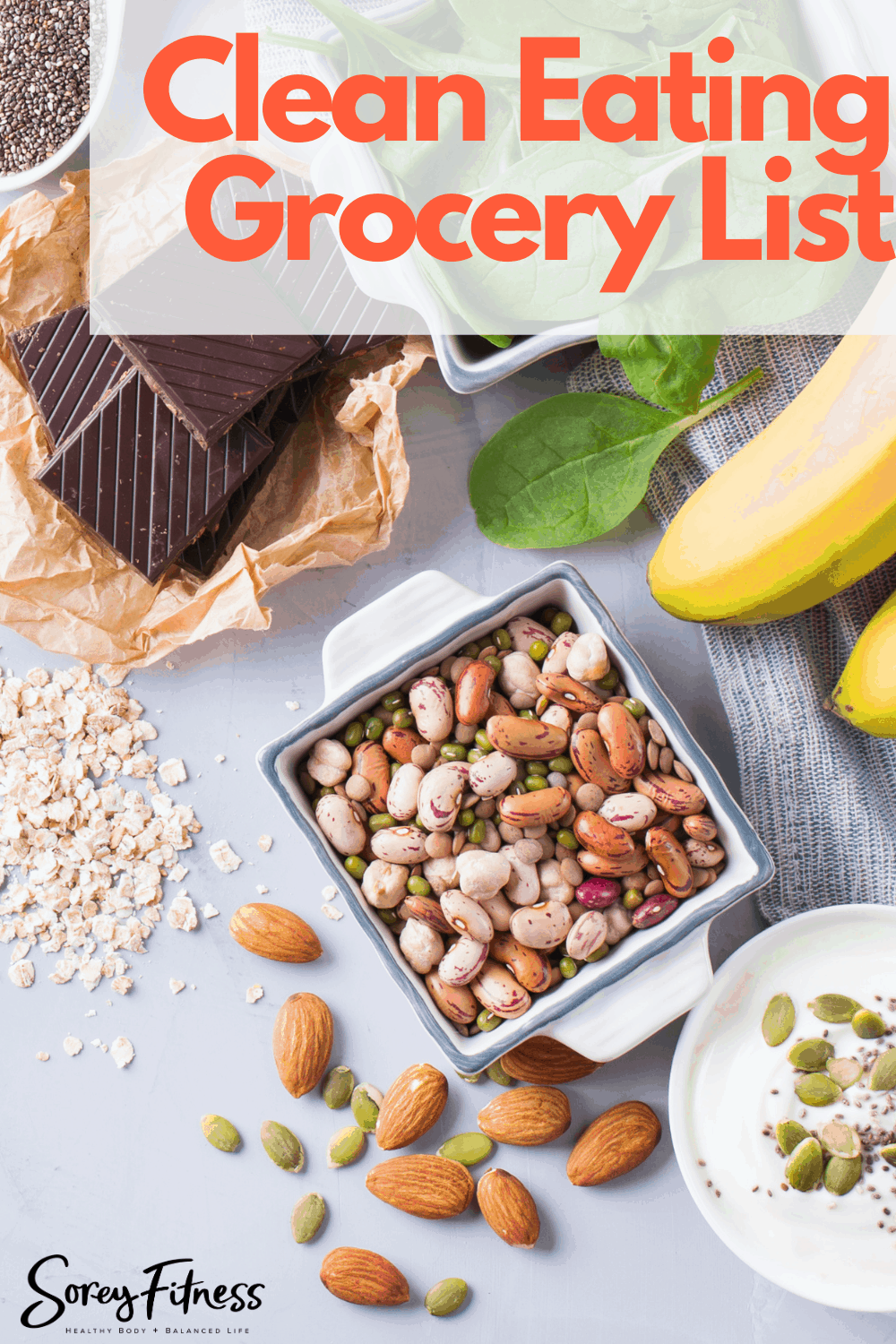
Flours and breads
When choosing flours to cook with and bread products, choose 100% whole grain when possible. Products labeled “made with whole wheat” or “wheat” do include white and refined flours, so they are not made from 100% whole grains.
- Whole wheat flour
- White whole wheat flour (still a whole grain wheat, but a different variety that’s lighter in color)
- Oat flour
- Rye flour
- Barley flour
- Spelt and einkorn (ancient varieties of wheat)
A possible breakfast or snack would be our paleo blueberry muffins!
Gluten Free Flours
- Buckwheat flour
- Gluten free oat flour
- Sorghum flour
- Whole millet flour
- Whole corn flour
- Amaranth
- Teff
- Tiger nut flour
Breads and gluten free breads:
- 100% whole grain breads (made with 100% whole grains, can be oat, wheat, rye, etc.)
- Sprouted grain breads, like Ezekiel bread
- Gluten free breads that are whole grain or mostly whole grain (finding whole grain gluten free breads can be difficult, so if you have to be gluten free, find the best options available to you!)
- 100% whole grain flatbreads and tortillas that have little to no artificial ingredients, preservatives, or hydrogenated oils
- Grain free/paleo breads that aren’t mostly made of simple starches (like tapioca flour)
Nuts and Seeds
Look for nuts that are raw and unsalted for the best options, or naturally cooked and seasoned nuts and seeds. Oil roasted nuts are actually oil fried, so and that have less salt. Raw, unsalted nuts are best!
- Cashews
- Almonds
- Pistachios
- Walnuts
- Pecans
- Hazelnuts and filberts
- Brazil nuts
- Peanuts (not actual nuts but legumes, we added this to the nut category though since people associate them with nuts).
- Sesame
- Pumpkin
- Chia
- Flaxseed (best eaten ground/milled)
- Psyllium
- Sunflower seeds
- Sacha inchi
We didn’t add coconut to this list since coconut is not a true tree nut, but rather a drupaceous fruit that is highly fatty, so we added that to the oils and fats list.
Nut and seed butters
When shopping for nut and seed butters, look for brands that don’t have artificial ingredients, added sugars (unless they are naturally sweetened), and don’t contain refined oils like hydrogenated oil.
- Peanut butter (that doesn’t contain hydrogenated oils)
- Almond butter
- Pumpkin seed butter
- Cashew butter
- Tahini (sesame seed butter)
- Sunflower seed butter
- Coconut butter (different from coconut oil in that this has ground coconut flesh in the mix, too)
We love American Dream Nut Butters in both peanut and almond varieties! You can get 10% off using the code KIMANDKALEE.
Oils and fats
When shopping for oils, look for oils that are ideally cold pressed and extra virgin oils (processed without solvents or chemicals) and without added preservatives.
- Virgin coconut oil
- Avocado oil
- Extra virgin olive oil
- Nut oils (walnut oil, almond oil, etc.)
- Sesame oil (mostly used for flavor, not suitable for high heat cooking)
- Sustainably sourced palm fruit oil (this is a great natural substitute for hydrogenated shortening like Crisco)
- Grass fed butter
- Ghee (clarified butter)
Check smoke points on the oils you choose, not all of them are suitable for high-heat cooking.
Consider avoiding highly refined oils or ones that are from crops that are genetically modified or are heavily sprayed with pesticides, such as canola oil (rapeseed oil), corn oil, and soybean oil. Avoid hydrogenated oils or partially hydrogenated oils like shortenings.
Dairy and eggs
If you’re eating a lower carbohydrate clean eating diet, then focus on high fat dairy products, like raw milk, whole milk, or full fat cheeses. If you’re watching your calories and trying to lose weight with a diet of moderate amounts of fat and higher protein, focus on dairy products that are moderate in fat, such as 2% milk.
- Whole eggs
- Quail eggs
- Duck eggs
- Cows milk (organic and grass fed if possible)
- Raw milk (this may be difficult to find in your area, if you can’t access it, use organic grass fed whole milk instead)
- Goat milk
- Sheep milk
- Unprocessed cheeses
- Yogurts that are unsweetened and plain, or are sweetened naturally and without artificial ingredients
- Cottage cheese
- Natural sour cream that does not contain artificial ingredients
- Natural cream cheese that does not contain artificial ingredients
- Unsweetened non-dairy milks (such as rice, almond, soy*, hemp, oat, coconut, cashew, etc.). Avoid non-dairy milks that have artificial ingredients.
Dairy products to avoid:
- Sweetened or flavored milks (unless they are naturally flavored or naturally sweetened with something like stevia)
- Process cheese products, like Cheese Whiz or American cheese.
- Sugary yogurts
- Yogurts that are artificially flavored or sweetened
Avoid non-dairy products that have a lot of added sugars, fillers, etc. Some dairy free cheeses are pretty highly processed, so we my family typically doesn’t eat them all the time.
* If you have high estrogen or hormone issues, consider using a different type of milk than soy milk.
Meats and proteins
Focus on whole-food meats that are grass fed and grass finished if possible. Some processed meats (like sausages or lunch meats) are okay if they are naturally made and do not contain preservatives like nitrates, nitrites, or artificial ingredients like MSG.
- Beef (grass fed and finished if possible)
- Pork
- Wild game such as venison, elk, moose, wild boar, etc.
- Bison
- Uncured and natural ham and bacon
- Turkey
- Chicken (cage free if possible)
- Shellfish
- Fish (try to eat sustainably farmed or wild caught varieties that are low in mercury)
- Uncured and natural lunch meats
- Uncured natural sausages that don’t contain MSG or hydrolyzed soy proteins
Meat substitutes
If you are vegan and do not eat meat, be careful about your choice of meat substitutes. Many meat substitutes are highly processed and not particularly healthy, so in some cases you’re better off skipping the meat substitutes unless they are made with natural and whole ingredients like beans, nuts, tubers, and vegetables.
We created a post about the whole food plant based diet that has some options for whole food plant based meal options rather than relying on processed meat substitutes.
Sweeteners
- Raw, unfiltered honey
- Unbleached or raw cane sugar
- Pure maple syrup
- Stevia
- Monk fruit
- Yacon syrup
- Coconut syrup
- Coconut sugar
- Maple sugar
- Date sugar
- Erythritol (only if naturally derived and you don’t have IBS)
- Xylitol (only if naturally derived)
- Agave syrup (only if it’s natural and less refined or processed)
Sweeteners to avoid:
- High fructose corn syrup
- Regular corn syrup
- Sorbitol and maltitol (these often cause digestive upset for most people)
- Artificial sweeteners like Splenda, Aspartame, etc.
Condiments
Most condiments are usually okay for a clean eating diet as long as they are made with natural ingredients and don’t contain artificial colors, flavors, sweeteners, or preservatives. Try to avoid condiments with high fructose corn syrups.
- Coconut aminos
- Natural and low sodium soy sauce
- Sea salt (unprocessed if possible)
- Black pepper
- Spices and seasonings that don’t contain artificial ingredients or fillers
- Naturally sweetened or natural sugar free condiments like ketchup or barbecue sauce
- Natural mayo without refined oils
- Mustards that are natural and have no artificial ingredients
Drinks
When choosing your drinks, avoid sugary sodas and opt for naturally sweetened or no-sugar-added sodas and natural drinks.
- Coffee (opt for natural brands that are organic if possible)
- Natural stevia sweetened sodas (like Zevia)
- Tea (black, green, white, or herbal)
- Water
- Flavored waters, like Hint (if they are naturally flavored and have no artificial ingredients)
- Unfiltered cold pressed fruit and vegetable juices (in moderation since they are more processed and often high in sugar)
We’ve also reviewed Crystal Light and Sparkling ICE! which are both filled with sweeteners.
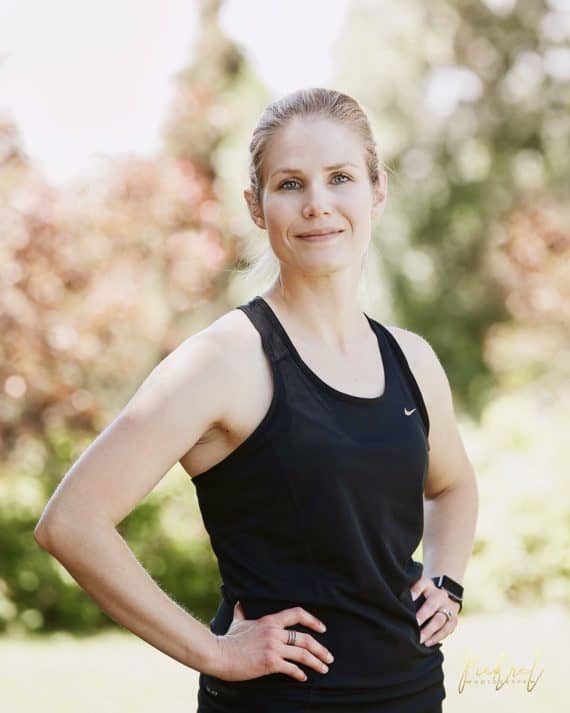
Sarah Jane Parker is a food and healthy living blogger at The Fit Cookie, an ACSM Certified Personal Trainer, ACE Certified Health Coach, Revolution Running certified running coach, YogaFit Level 1 certified yoga instructor, ACE Fitness Nutrition Specialist, and ACE Functional Fitness Specialist.

